Inside Manzana de Gomez, Cuba's new luxury mall
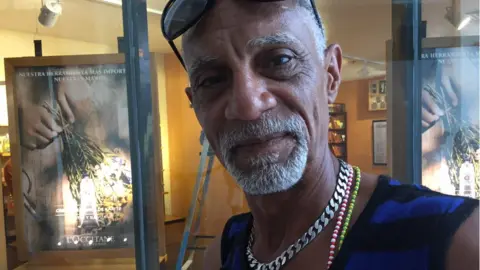 BBC
BBCSchoolkids taking selfies outside expensive stores is doubtless a feature of high-end shopping malls everywhere.
For years, there was nowhere in Havana for them to do so.
Now though, they're descending on a lavishly refurbished shopping arcade called the Manzana de Gomez - a small corner of capitalist consumerism in one of the world's last communist strongholds.
Ornate chandeliers, polished marble floors and gleaming brass fittings - it's comparable with any New York boutique.
So much so that world-renowned brands like Mont Blanc, Gucci and Lacoste have opened branches in the arcade, many on sale in Cuba for the first time.
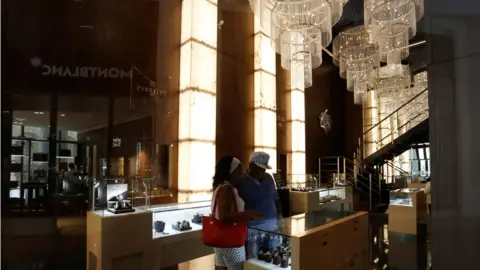 Reuters
ReutersSome of the luxury on display is eye-watering for most Cubans. There are Longines and Bulgari watches and jewellery on sale that cost more than $10,000 (£7,700), well beyond the annual budget of ordinary Cuban families.
As a handful of school-uniformed teenagers emerged, smiling and empty-handed, from L'Occitane en Provence, I asked them how much the hand creams and facial scrubs were inside.
"Impossibly expensive!" one of them giggled.
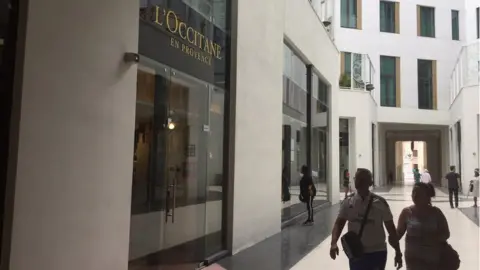
"I'm just here to look and admire," said Diana, a middle-aged woman staring at the window display of Nikon cameras.
Further inside, Antonio simply laughed at the price tags on the Armani suits. "Do you know what Cubans earn?" he asked rhetorically.
Officially, state wages in Cuba are around $25 a month, meaning these shops are intended for foreign visitors or a new brand of wealthy Cuban.
In its heyday the Manzana de Gomez was the finest shopping experience in the Caribbean. Today, it's the latest step in rebuilding Old Havana, the crumbling colonial centre of the Cuban capital.
Built in the early 1900s by a Cuban businessman, Jose Gomez-Mena Vila, the five-storey shopping mall has been painstakingly restored over the past few years and turned into a five-star hotel, the Hotel Manzana, run by the Swiss chain, Kempinski.
The shopping complex on the ground floor - as well as the hotel prices of $440 a night for the cheapest room and almost $2,500 for the most expensive - are indications of the type of upscale clientele they're aiming for.
Although managed by the Swiss firm, the luxurious property is owned by the tourism wing of the Cuban military, Gaviota, in the kind of international partnership that is likely to form the blueprint for major tourism infrastructure in Cuba in the coming years.
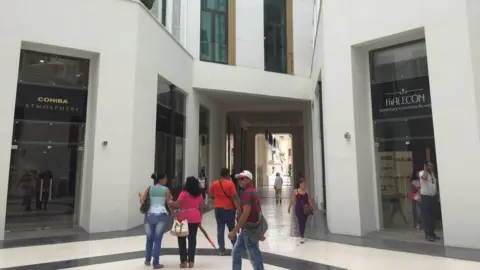
On Wednesday, Cuba's high society turned out in force for the official unveiling. However, while the Cuban authorities will undoubtedly be pleased of new hotel rooms amid a tourism boom, it also comes at a sensitive time.
Cubans and Americans alike are waiting to see if President Donald Trump continues with Barack Obama's policy of engagement with Cuba or reverses it, and puts the bilateral relationship back onto a more hostile footing. Many fear the latter.
Specifically working with Gaviota - or any military-owned company in Cuba - has been cited as one of the key reasons the Trump Administration is considering a rollback on President Obama's thaw.
President Trump is being urged by the traditional anti-Castro lobby in Florida to prevent any US entity from working with the commercial wings of the Cuban military and to "treat Cuba like the dictatorship it is", as Florida Senator Marco Rubio put it recently.
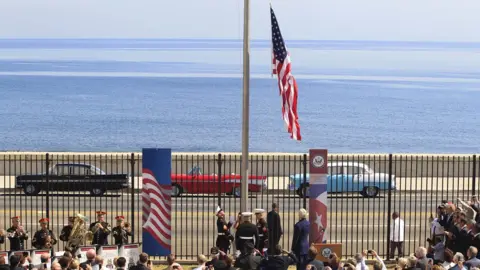 Reuters
ReutersFurthermore, the US president might make it harder for Americans to reach the island by reinstating parts of the travel ban lifted by his predecessor.
Supporters of President Obama's policy of thaw point to numbers released by the popular accommodation website, AirBnB. They claim that bookings through their page have generated $40m for Cubans since 2015, and that 58% of the beneficiaries were women.
Meanwhile the pro-engagement lobby group, Engage Cuba, has argues that the cost to the US of reversing the policy of thaw would be $6.6bn in lost revenue for airline and cruise ship companies among others.
Back amid the expensive Gucci handbags and earrings, I met Francisco, a retired agronomist with dark skin and a shock of silver hair. He was quick to acknowledge that there are those who resent the exorbitant prices of the Manzana de Gomez.
For him, that reaction only tells half the story.
"Tourism is the motor of our economy now," he said, with unerring clarity. "These prices, I understand, are the same the world over so why wouldn't tourists want to buy a memento from Cuba?" nodding at some costly-looking silver-plated fountain pens.
"I live off the libreta" he told me frankly - a reference to the ration book which still covers the basic staple goods like eggs and powdered milk for most Cuban households.
"But there are now Cubans who can afford these things," he shrugged.
